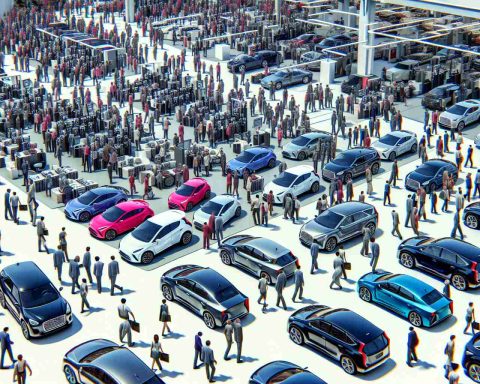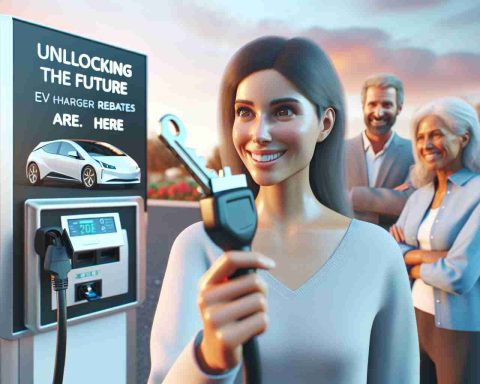The automotive landscape in 2024 painted a mixed picture, with new car registrations experiencing a modest 0.8% increase, totaling around 10.6 million units. Spain emerged as a standout performer, boasting an impressive growth rate of 7.1%. However, key players like France, Germany, and Italy struggled, showing declines of 3.2%, 1%, and 0.5%, respectively.
Remarkably, December 2024 saw a bump of 5.1% in new EU car registrations. Spain triumphed again, showcasing a formidable 28.8% rise, while France managed a slight gain of 1.5%. In stark contrast, major markets such as Germany and Italy faced substantial declines of 7.1% and 4.9%.
When examining car preferences, battery-electric vehicles held their position as the third most favored option among consumers, with a market share of 13.6% for the year. Despite this, registrations of electric cars plummeted by 10.2% in December due to significant downturns in Germany and France. On the other hand, plug-in hybrid registrations climbed 4.9%, fueled by notable increases in France and Germany.
Petrol cars suffered a drop of 1.8% in December, led by a steep fall in France, while diesel vehicles saw a grim 15% decrease in their market share. Overall, the EU automotive sector continues to face challenges even as some markets demonstrate resilience.
Future Trends in the European Automotive Sector
The automotive industry is at a crossroads, with shifting consumer preferences and regulatory pressures redefining its landscape. The modest overall growth in new car registrations, especially the significant rise in Spain, highlights more than just market health; it reflects a shift toward dynamic automotive strategies tailored to consumer behavior and expectations.
Cultural shifts, particularly in the realm of sustainability, are influencing purchasing decisions. With battery-electric vehicles (BEVs) still capturing a sizeable share of the market, despite recent declines, it’s clear that European consumers are increasingly prioritizing eco-friendliness amidst rising climate awareness. The projected 4.9% growth in plug-in hybrids underscores a transitional phase, as buyers navigate between traditional combustion engines and full electrification options.
From an economic standpoint, the challenges faced by major economies like Germany and Italy could signal a deeper structural issue within their automotive sectors. These nations, historically seen as bellwethers, may need to innovate more aggressively or risk losing market relevance to countries like Spain, which is capitalizing on increasing consumer enthusiasm for modern automotive technologies.
Long-term implications include potential environmental benefits as manufacturers respond to demand shifts by increasing investments in greener technologies. As regulatory frameworks tighten across the EU, the automotive industry may witness accelerated advancements in fuel efficiency and emissions reductions. In this evolving landscape, a proactive embrace of change will be crucial for brands aiming to navigate the complexities of consumer sentiment and environmental responsibility. In summary, the future of the automotive scene rests not only on market statistics but on the broader societal commitment to a sustainable driving experience.
The Shifting Dynamics of the EU Automotive Industry in 2024
The automotive landscape in 2024 presents a complex picture, showcasing both resilient growth in specific regions and notable declines in others. While new car registrations across the European Union experienced a modest increase of 0.8%, reaching approximately 10.6 million units, the underlying trends reveal significant disparities among member states.
Market Performance Comparison
Spain has emerged as a standout performer, achieving a remarkable growth rate of 7.1% in new car registrations. This growth can be attributed to increased consumer confidence and robust economic recovery efforts in the region. Conversely, larger automotive markets such as France, Germany, and Italy faced declines, posting reductions of 3.2%, 1%, and 0.5%, respectively.
# Monthly Trends
December 2024 illustrated a more pronounced shift, with a 5.1% increase in new EU car registrations. Spain once again led the charge with an impressive 28.8% surge. However, Germany and Italy struggled considerably, with declines of 7.1% and 4.9%, pointing to a potential market correction during the winter season.
Vehicle Preferences and Market Dynamics
Battery-electric vehicles (BEVs) continued to gain traction, securing a market share of 13.6%, despite experiencing a 10.2% decline in registrations in December. This decline was largely influenced by drops in key markets like Germany and France, signaling potential consumer hesitation or supply chain issues.
On a brighter note, plug-in hybrid vehicles experienced a notable increase of 4.9% in registrations, buoyed by strong demand particularly in France and Germany. This shift may indicate a growing consumer preference for hybrid solutions as a transitional phase towards full electrification.
# Fuel Type Trends
Traditional petrol vehicles faced challenges, seeing a decline of 1.8% in registrations during December, primarily driven by substantial losses in France. Diesel vehicles, once champions of the European market, endured a drastic 15% decrease in market share, reflecting increasing regulatory pressures and a growing shift towards greener alternatives.
Innovations and Future Trends
The automotive industry in 2024 is experiencing transformative innovations, particularly in the realm of sustainability and electrification. As manufacturers focus on producing more








